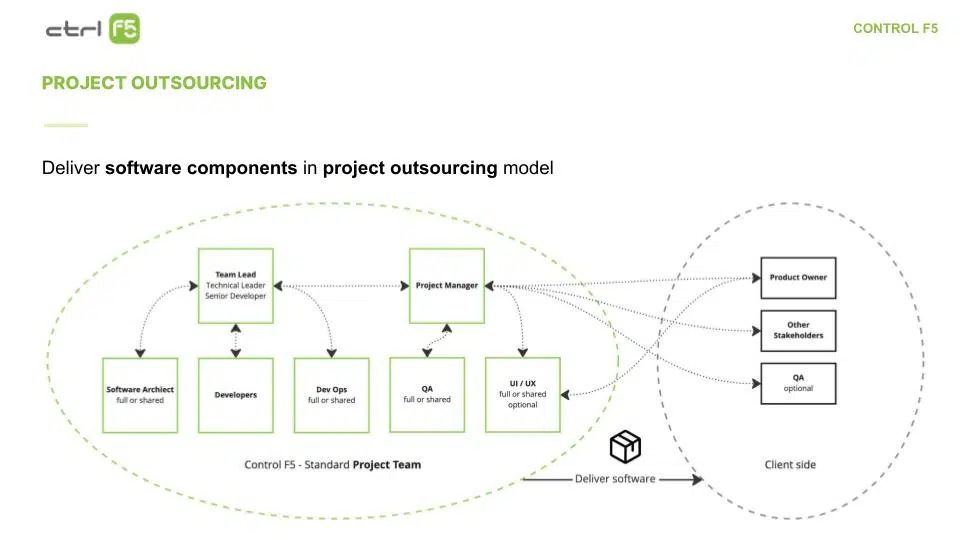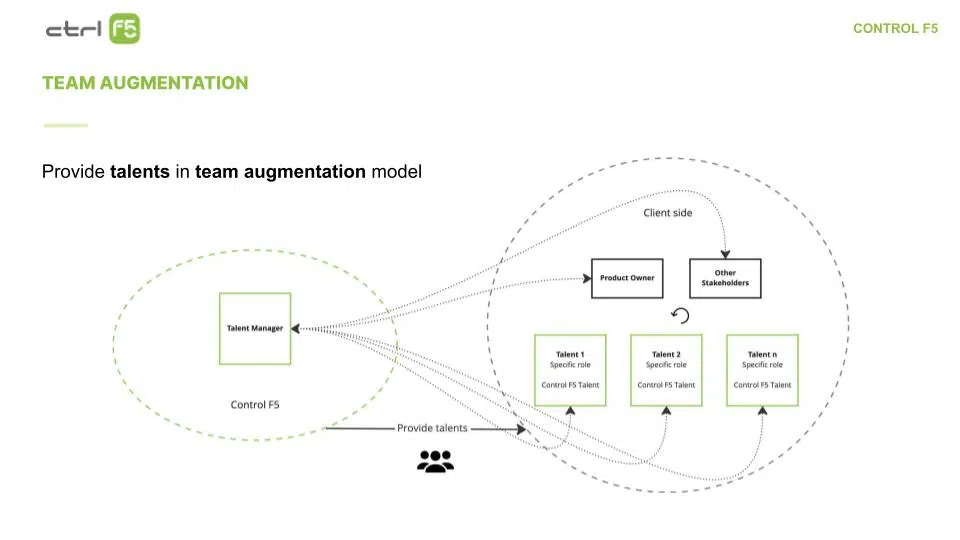We all know that we need to consult specialists for different situations in our lives. For example, if we want to learn a foreign language, we go to a teacher, if we have a medical problem, we go to a doctor. And if we are, for example, a travel agency and we need a special software to show us instant up-to-date information about the hotels in our portfolio, it might be easier to go to an IT outsourcing company than to hire a dedicated person for this project.
Software outsourcing is the practice of hiring a third-party company or individual to handle some or all of a business’s software development needs. This can include tasks such as designing and building software applications, maintaining and updating existing software, and providing technical support and assistance.
Reasons and benefits
You may choose to outsource your software development for a variety of reasons. Some of the main reasons are:
Access to specialised expertise and skills
One of the biggest benefits of outsourcing software development is the ability to access specialised expertise and skills that you don’t have in-house.
This can include highly technical skills such as artificial intelligence, machine learning and data science, as well as specialised knowledge in specific industries or business domains.
By outsourcing software development, you can ensure that you have the right people working on your project, regardless of whether you have those skills in-house
Cost savings
Outsourcing can often be more cost-effective than hiring in-house developers, particularly when you only have occasional or intermittent software development needs.
Outsourcing allows you to access a global pool of talent, which means you can find the best people for the job at a lower cost than hiring in-house developers.
Faster project completion
Outsourcing can also help you complete projects faster. This is because outsourced teams can often work on a project around the clock, allowing for faster development and deployment. In addition, outsourcing can help you avoid delays and bottlenecks caused by having to wait for in-house developers to become available to work on a project.
Improved quality
This is because you can choose to outsource to providers with a proven track record of delivering high-quality software. In addition, outsourcing can allow you to tap into the latest technologies and best practices in the field, which can help you build better software.
Increased flexibility
You can scale up or down your software development efforts quickly and easily, depending on your needs. It can be particularly useful when you have fluctuating or unpredictable software development needs.
“Since 2012 when we launched ControlF5 and have worked on over 50 projects and with over 30 clients, we have noticed that the advantage our partners appreciate most is to have a ready-to-work team with all the knowledge and processes needed in order to build a product or solution in an optimal way. It is a mix of having access to specialized expertise and the capacity for fast and qualitative delivery.
Another appreciated advantage I think is the flexibility, in terms of scaling the delivered volume and skills but also in terms of the working model. We were always open to new ideas, technologies, projects and even collaboration models”, explains Ștefan Iorgulescu, cofounder and CEO Control F5.
Risks and challenges
Loss of control
One of the biggest risks of outsourcing software development is the potential loss of control over the project. When you outsource software development, you are entrusting the development of a critical part of your business to a third party. This can make it more difficult for you to ensure that the project is being handled properly, and it can also make it harder to make changes or adapt to new requirements.
Communication challenges
Another potential challenge of outsourcing software development is the need to effectively communicate and coordinate with the outsourced team. This can involve ensuring that the team understands the project requirements and is meeting deadlines, as well as addressing any issues that may arise during the development process. Effective communication and coordination is essential for ensuring a successful outsourcing relationship.
Cultural and language barriers
In some cases, you may choose to outsource software development to teams located in other countries. This can introduce cultural and language barriers that can make communication and coordination more difficult. You need to be aware of these potential barriers and take steps to overcome them in order to ensure a successful outsourcing relationship.
Intellectual property and security concerns
Outsourcing software development can also raise concerns about intellectual property and security. You need to carefully protect your intellectual property and ensure that your confidential information remains secure when working with an outsourced team. This can involve implementing appropriate security measures and signing non-disclosure agreements with the outsourced provider.
“The main concerns of our customers over the years have been somehow related to the fear of losing control over the project, but also fears regarding intellectual property or security concerns. We have overcome these situations by building a solid and transparent collaboration process.
For example, our entire software development process is totally transparent and our clients have total access to the product and sprint backlog, estimations, status meetings, or other ceremonies we use. We keep close communication with the client’s Product Owner or other stakeholders.
Regarding the intellectual property both in terms of legal papers and code or any other deliverable storage, are totally in client control from the beginning of our collaboration”, explains Ștefan Iorgulescu.
Outsourcing models
Project-based outsourcing
In this model, you contract the outsourcing partner to develop a specific software application or system. The outsourcing partner is responsible for all aspects of the project, from design and development to testing and deployment.

Outstaffing
The outsourcing partner provides a specific number of software development professionals to work on the your projects. The professionals are typically located at the your office and work as part of the your team.

Choosing the right partner
This can be a crucial decision for any company. With the right partner, you can achieve your software development goals and achieve success. On the other hand, a wrong partner can cause delays, additional costs, and even project failure.
Here are some key factors you should consider when choosing your software development partner:
Experience and expertise
The software development partner should have a proven track record of delivering successful software development projects. They should have experience in the specific technology stack and industry that you operate in.
Communication and collaboration
Excellent communication and collaboration skills are a must. They should be able to understand your requirements and provide regular updates on the project’s progress.
Flexibility and adaptibility
They should be flexible and adaptable to changing requirements and deadlines. Also they should have the capability to adapt to your unique needs and provide solutions that meet those needs.
Cost-effectiveness
Providing competitive pricing and being able to deliver value for money is another key factor. They should have a transparent pricing model and should be able to provide a detailed breakdown of their costs.
Quality assurance
Last but not least, they should have a robust quality assurance process in place, in order to identify and fix defects before they impact your project delivery.
“In our case, I think the main factor that contributes when a client chooses us is the proven expertise in similar or known projects. A lot of our clients have been referred to us by other clients for whom we have delivered qualitative services.
Part of our mission is to always exceed the expectation of our clients, and this approach helped us to have a strong relationship with our partners. Values like communication, trust, respect, loyalty and fairness are the pillars we build our company on and the recipe for strong relationships, either they are with clients or any other collaborators”, adds Ștefan Iorgulescu.
Managing outsourcing relationship
“In my opinion, a good relationship is based on trust, and in an outsourcing software development collaboration trust is needed from both sides in many aspects, especially in the initial steps.
One challenge, for example, is to budget a project and then ensure you stay within the budget and deliver a functional product according to the initial goals. Because trust is something that needs to be built over time, we use a set of practices to split the project into small parts and individually estimate them on a high level at first. We build a roadmap and a budget and then deliver small increments of the product. After each increment, we reevaluate the estimates and if needed redefine the product specifications if changes are needed. This way we constantly ensure together with the client that we stay within the budget and the goals”, explains Control F5 cofounder.
Outsourcing relationships can be complex and challenging to manage sometimes. It is important for you to have clear processes and best practices in place to ensure the success of your partnerships.
Clearly define the scope of the relationship
It is important for both parties to have a clear understanding of the tasks, responsibilities, and expectations associated with the outsourcing arrangement. This can help to avoid misunderstandings and ensure that the relationship is aligned with the your goals and needs.
Choose a reputable and reliable outsourcing partner
You should carefully research and evaluate potential outsourcing partners to ensure they have the necessary skills, experience, and track record to deliver high-quality results. It is also important to consider factors such as the company’s reputation, financial stability, and management style.
Establish clear communication channels
Effective communication is key to the success of any outsourcing relationship. You should ensure that there are clear channels of communication in place, such as regular meetings, updates, and progress reports, to help keep both parties informed and aligned.
Set clear performance metrics and benchmarks
It is important to have clear performance metrics in place to measure the success of your outsourcing relationship. This could include metrics such as cost savings, efficiency improvements, or customer satisfaction. Setting clear benchmarks can help to ensure that both parties are working towards common goals and can help to identify and address any issues that arise.
Foster a culture of collaboration and trust
A successful outsourcing relationship requires a high level of trust and collaboration between the two parties. You should strive to create a positive and supportive working environment that encourages open communication and fosters a sense of teamwork.
So, we can conclude that
Software outsourcing can provide numerous benefits to businesses, including access to specialized expertise, cost savings, faster project completion, improved quality, and increased flexibility.
However, it also comes with risks and challenges, such as loss of control, communication and coordination challenges, cultural and language barriers, and intellectual property and security concerns.
Choosing the right outsourcing partner is crucial, and it should be based on factors such as experience and expertise, communication and collaboration, flexibility and adaptability, cost-effectiveness, and quality assurance.
To ensure a successful outsourcing relationship, it is essential to have clear processes and best practices in place, including clearly defining the scope of the relationship and choosing a reputable and reliable outsourcing partner.
We have helped 20+ companies in industries like Finance, Transportation, Health, Tourism, Events, Education, Sports.












